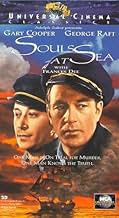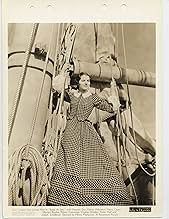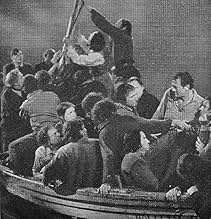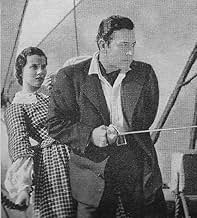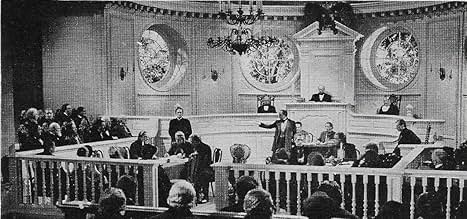Ajouter une intrigue dans votre langueCooper and Raft save lives during a sea tragedy in this story about slave trade on the high seas in 1842.Cooper and Raft save lives during a sea tragedy in this story about slave trade on the high seas in 1842.Cooper and Raft save lives during a sea tragedy in this story about slave trade on the high seas in 1842.
- Nommé pour 3 oscars
- 3 nominations au total
Norman Ainsley
- Ticket Taker
- (uncredited)
Histoire
Le saviez-vous
- AnecdotesWhen Nuggin and Powdah are in a tavern, the bartender immerses a hot iron into their beer mugs. This was most likely part of making a popular sailor's drink at the time called a "flip". It was made with beer, rum, sugar or molasses (and possibly a spice like cinnamon or cloves). The hot poker caramelizes the sugar. The technique was also just a quick way to warm beer during the winter.
- GaffesReading Hamlet aloud, Gary Cooper says, "the thousand natural shocks that the flesh is heir to." The second "the" is a mistake--it spoils the scansion.
- Citations
Michael 'Nuggin' Taylor: The floor of the ocean is paved with the bones of slaves.
- ConnexionsReferenced in Make Way for Tomorrow (1937)
Commentaire en vedette
It's a given that captains of cruise liners have a sworn duty to protect their passengers in case of any emergency, and their safety is paramount to any other concerns. Unfortunately, it hasn't always been the case. August 1937's "Souls at Sea," starring Gary Cooper, is based on the 1841 sinking of the 'William Brown,' a packet ship that hit an iceberg, sending its passengers scurrying into two lifeboats. Trouble was, one of the lifeboats became extremely overloaded, causing members of the ship's crew to toss some passengers over the side to avoid sinking the packed boat.
"This obscure film is so wonderful because (George) Raft and Cooper are dynamite together," gushed film reviewer Dennis Schwartz. "So who knew both laconic actors could be so animated and such a joy to watch together!"
Henry Hathaway directed this seafaring tragedy as Paramount Picture's version of MGM's 1935 "Mutiny on the Bounty." Cooper's character, Michael Taylor, is first seen in a courtroom listening to his verdict of guilty of murder for shooting at several desperate passengers clinging to the lifeboat. In the movie, the 'William Brown' sinks from a fire started by a young girl accidentally knocking over an oil lamp. Taylor takes charge of the lifeboat that's becoming swamped by too many survivors in the middle of the ocean. He feels he needs to take action or else everyone will drown. After the verdict was read, a British Navy official pointed out that his heroic actions on the lifeboat saved lives. He also added Taylor's work as an undercover abolitionist assisting the English in thwarting the illegal African slave trade to the United States should also be considered and the jurists should suspend his sentence.
"Souls At Sea" highlights details from the 1842 Supreme Court case United States vs. Holmes. After the 'William Brown' sinking where 12 passengers were forced out of the lifeboat by the ship's crew and drowned, only one crewman on the lifeboat, Alexander Holmes, was found in Philadelphia to stand trial. He was indicted for murder, but the jury came back with a less severe manslaughter verdict, sending the case all the way to the Supreme Court. The court ruled the crew's paramount duty was to the save the passengers, and if there were any life-threatening sacrifices to be made, the crew should go first.
"Souls at Sea" contains a flashback involving a series of romantic interests. Navy Lieutenant Stanley (Henry Wilcoxon), captain of the 'William Brown' secretly works for slave traders. Stanley and Taylor eventually come to blows, even though the abolitionist has fallen in love with the captain's sister, Margaret (Frances Dee). George Raft, as Taylor's buddy, Powdah, is also romantically linked to another woman on board, Babsie (Olympe Bradna).
One event related to "Souls at Sea" may have inspired the 1937 movie "A Star Is Born" which involved John Bowers. The former silent movie star, unemployed in Hollywood since 1931, was one of many actors unable to make the transition to sound. He had worked with Henry Hathaway in the past and knew the director was filming scenes for "Souls at Sea" off the shore of Catalina Island. Hoping to get a walk-in role, Bowers rented a small 16-foot sailboat to meet Hathaway, only to receive a firm rejection from him. He was last spotted sailing on his small boat away from the island, never to be seen alive. His body washed up on the Santa Monica beach, presumably from suicide, a fate Norman Maine suffered as he walked into the ocean at the conclusion of "A Star Is Born."
"Souls At Sea" was labeled 'artistically valuable' by the German government, one of the few Hollywood movies that Joseph Goebbels, the minister of propaganda, promoted for the increasingly restrictive country's movie import market. The Nazis' thinking followed the Aryan race philosophy that some groups of people had to be sacrificed for the good and the advancement of the German nation. The Paramount motion picture received three Academy Award nominations, including Best Assistant Director (Hal Walker) (in its last year as a category), Best Art Direction (Hans Dreier and Roland Anderson), and Best Music Scoring (Boris Morros).
"This obscure film is so wonderful because (George) Raft and Cooper are dynamite together," gushed film reviewer Dennis Schwartz. "So who knew both laconic actors could be so animated and such a joy to watch together!"
Henry Hathaway directed this seafaring tragedy as Paramount Picture's version of MGM's 1935 "Mutiny on the Bounty." Cooper's character, Michael Taylor, is first seen in a courtroom listening to his verdict of guilty of murder for shooting at several desperate passengers clinging to the lifeboat. In the movie, the 'William Brown' sinks from a fire started by a young girl accidentally knocking over an oil lamp. Taylor takes charge of the lifeboat that's becoming swamped by too many survivors in the middle of the ocean. He feels he needs to take action or else everyone will drown. After the verdict was read, a British Navy official pointed out that his heroic actions on the lifeboat saved lives. He also added Taylor's work as an undercover abolitionist assisting the English in thwarting the illegal African slave trade to the United States should also be considered and the jurists should suspend his sentence.
"Souls At Sea" highlights details from the 1842 Supreme Court case United States vs. Holmes. After the 'William Brown' sinking where 12 passengers were forced out of the lifeboat by the ship's crew and drowned, only one crewman on the lifeboat, Alexander Holmes, was found in Philadelphia to stand trial. He was indicted for murder, but the jury came back with a less severe manslaughter verdict, sending the case all the way to the Supreme Court. The court ruled the crew's paramount duty was to the save the passengers, and if there were any life-threatening sacrifices to be made, the crew should go first.
"Souls at Sea" contains a flashback involving a series of romantic interests. Navy Lieutenant Stanley (Henry Wilcoxon), captain of the 'William Brown' secretly works for slave traders. Stanley and Taylor eventually come to blows, even though the abolitionist has fallen in love with the captain's sister, Margaret (Frances Dee). George Raft, as Taylor's buddy, Powdah, is also romantically linked to another woman on board, Babsie (Olympe Bradna).
One event related to "Souls at Sea" may have inspired the 1937 movie "A Star Is Born" which involved John Bowers. The former silent movie star, unemployed in Hollywood since 1931, was one of many actors unable to make the transition to sound. He had worked with Henry Hathaway in the past and knew the director was filming scenes for "Souls at Sea" off the shore of Catalina Island. Hoping to get a walk-in role, Bowers rented a small 16-foot sailboat to meet Hathaway, only to receive a firm rejection from him. He was last spotted sailing on his small boat away from the island, never to be seen alive. His body washed up on the Santa Monica beach, presumably from suicide, a fate Norman Maine suffered as he walked into the ocean at the conclusion of "A Star Is Born."
"Souls At Sea" was labeled 'artistically valuable' by the German government, one of the few Hollywood movies that Joseph Goebbels, the minister of propaganda, promoted for the increasingly restrictive country's movie import market. The Nazis' thinking followed the Aryan race philosophy that some groups of people had to be sacrificed for the good and the advancement of the German nation. The Paramount motion picture received three Academy Award nominations, including Best Assistant Director (Hal Walker) (in its last year as a category), Best Art Direction (Hans Dreier and Roland Anderson), and Best Music Scoring (Boris Morros).
- springfieldrental
- 16 oct. 2023
- Lien permanent
Meilleurs choix
Connectez-vous pour évaluer et surveiller les recommandations personnalisées
- How long is Souls at Sea?Propulsé par Alexa
Détails
- Durée1 heure 32 minutes
- Couleur
- Rapport de forme
- 1.37 : 1
Contribuer à cette page
Suggérer une modification ou ajouter du contenu manquant


